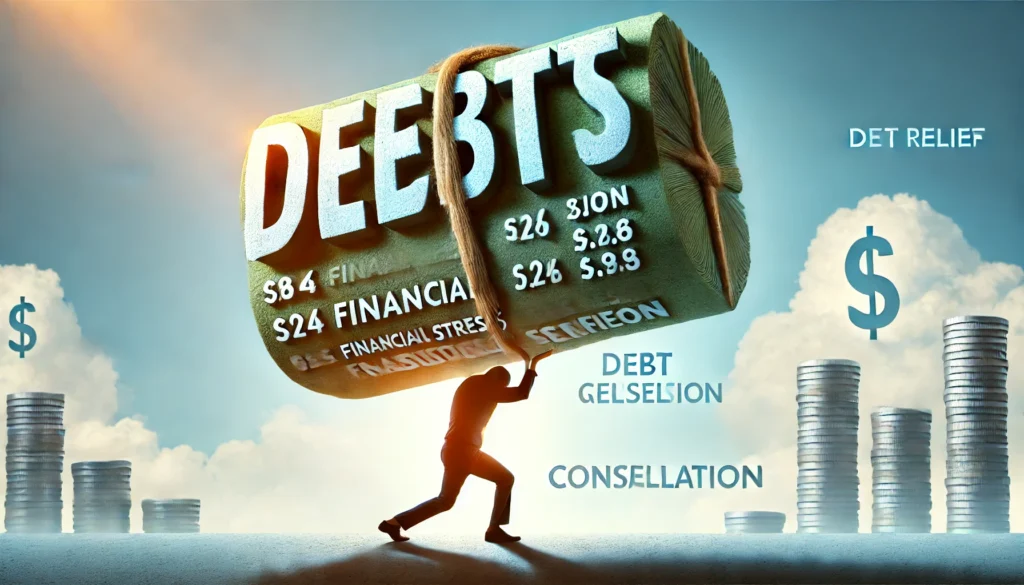Understanding Debt Relief and Debt Consolidation
When student loan borrowers struggle to keep up with payments, they often seek solutions that can alleviate their financial burden. Two common strategies are debt relief or consolidation, but they serve different purposes and have distinct long-term implications. Understanding debt relief vs. debt consolidation is crucial for choosing the right approach based on individual financial circumstances.
You may also like: Federal Direct Consolidation Loan: A Smart Strategy to Simplify Student Debt
Debt relief typically refers to programs that either forgive, reduce, or restructure a borrower’s debt to make repayment more manageable. This can include student loan forgiveness programs, income-driven repayment plans, and negotiated settlements with lenders. On the other hand, debt consolidation combines multiple student loans into a single loan, usually with a fixed interest rate, to simplify repayment. While both options can provide financial relief, choosing between debt relief vs. consolidation depends on various factors such as loan type, financial hardship, and long-term financial goals.

Evaluating the Pros and Cons of Debt Relief
Debt relief can be an attractive option for borrowers who are struggling with overwhelming student loan debt. Federal programs, such as Public Service Loan Forgiveness (PSLF) and income-driven repayment forgiveness, can lead to significant reductions in the amount owed. However, private student loan borrowers may not have access to the same relief options, making it necessary to explore alternative methods such as debt settlement.
While debt relief programs can provide much-needed assistance, they often come with strict eligibility criteria. Borrowers who fail to meet these requirements may need to consider debt relief or consolidation as an alternative. Additionally, some debt relief options, such as debt settlement, can negatively impact credit scores and future borrowing potential. It is crucial for borrowers to carefully assess the implications of debt relief before proceeding with this strategy.

How Debt Consolidation Works and Its Benefits
Debt consolidation is a structured approach to managing student loans by combining multiple debts into a single loan with a fixed interest rate. This option is particularly beneficial for borrowers who want to streamline their repayment process and potentially secure a lower interest rate. Federal student loan borrowers can consolidate their loans through a Direct Consolidation Loan, while private borrowers may need to apply for a personal loan or refinance their existing loans.
One of the main advantages of debt consolidation is that it simplifies the repayment process by reducing the number of monthly payments. Borrowers who choose consolidation can also benefit from fixed interest rates, preventing fluctuations in repayment amounts. However, consolidation does not necessarily reduce the total amount owed, making it a less favorable option for those seeking debt forgiveness or relief. For borrowers who need more substantial assistance, comparing debt relief vs. debt consolidation is essential.

Debt Relief vs. Debt Consolidation: Key Differences
The decision between debt relief vs. consolidation ultimately depends on the borrower’s financial situation and repayment goals. Debt relief is often best suited for those who qualify for forgiveness programs or need assistance reducing their overall debt burden. Meanwhile, debt consolidation is a practical choice for borrowers who can manage their debt but want to simplify payments and secure better loan terms.
A key difference between the two options is the impact on a borrower’s credit score. Debt relief programs that involve settlement or forgiveness can initially lower credit scores, as they may indicate financial hardship. However, once debts are resolved, credit scores can improve over time. In contrast, debt consolidation generally has a more neutral impact on credit, as long as borrowers continue to make on-time payments.
Choosing the Right Strategy for Your Financial Needs
Determining whether to pursue debt relief or consolidation requires careful consideration of personal financial circumstances. Borrowers should evaluate factors such as loan type, interest rates, monthly payment amounts, and eligibility for federal assistance programs. Those with federal student loans should explore income-driven repayment plans and forgiveness programs before deciding on consolidation.
Private student loan borrowers may find consolidation to be the better option if they can secure a lower interest rate or more favorable repayment terms. However, those in severe financial distress should explore whether debt settlement or other relief options could provide a viable solution. Ultimately, understanding debt relief vs. debt consolidation and seeking professional financial advice can help borrowers make the most informed decision for their long-term financial health.
Frequently Asked Questions (FAQ)
What is the primary difference between debt relief or consolidation?
Debt relief or consolidation are two distinct financial strategies aimed at helping individuals manage debt, but they function differently. Debt relief often involves negotiating with creditors to reduce the total amount owed, while consolidation combines multiple debts into a single loan with one monthly payment. Debt relief may include settlement programs or bankruptcy, which can lower the outstanding balance but may negatively impact credit scores. On the other hand, consolidation typically helps by simplifying payments and potentially lowering interest rates, making debt repayment more manageable. Understanding the nuances of debt relief vs debt consolidation can help borrowers select the best approach for their financial situation.
When should someone choose debt relief vs debt consolidation?
Choosing between debt relief vs debt consolidation depends on the severity of financial hardship and long-term financial goals. If a borrower is overwhelmed with unmanageable debt and unable to make minimum payments, debt relief may be a suitable option to negotiate a reduced balance. Conversely, if the borrower has a steady income but struggles with multiple high-interest debts, consolidation can streamline payments and reduce interest rates without the negative impact of settlement. It’s essential to assess financial stability and consider future credit implications when deciding between debt relief or consolidation. Consulting a financial advisor can provide personalized guidance on selecting the most effective strategy.
How does debt relief vs consolidation affect credit scores?
The impact of debt relief vs consolidation on credit scores varies depending on the method used. Debt relief programs, such as settlement or bankruptcy, can significantly lower credit scores because they involve negotiating for a reduced payment amount. Creditors may report settled accounts as “paid for less than the full amount,” which can remain on credit reports for years. Debt consolidation, however, generally has a less severe impact, as it involves paying off existing debts in full while restructuring payments into a single loan. For borrowers concerned about credit health, debt relief or consolidation should be carefully evaluated to determine the best long-term solution.
What are the long-term benefits of debt relief or consolidation?
Both debt relief or consolidation offer long-term benefits when executed strategically. Debt relief can provide a fresh start by eliminating a portion of outstanding debt, allowing borrowers to regain financial stability. However, it requires disciplined financial management to prevent future debt accumulation. Debt consolidation simplifies debt repayment, often reducing interest rates and making budgeting easier over time. Borrowers who successfully complete either strategy can improve financial health by developing better spending habits and maintaining consistent payments. Understanding debt relief vs debt consolidation in terms of future financial security ensures borrowers choose the most sustainable option.
What are the risks of debt relief vs debt consolidation?
Debt relief or consolidation each have potential risks that borrowers should consider before making a decision. Debt relief, particularly settlement programs, can lead to tax consequences since forgiven debt may be considered taxable income. Additionally, some debt relief programs charge fees, and unsuccessful negotiations may result in further financial strain. Debt consolidation, while generally less risky, may extend repayment terms, leading to higher overall interest costs in the long run. Borrowers who fail to make payments on a consolidation loan may face default, which can damage their credit standing. Evaluating the pros and cons of debt relief vs consolidation ensures that borrowers select the option that aligns with their financial stability.
Can debt relief or consolidation help with secured and unsecured debt?
Debt relief or consolidation is typically more effective for unsecured debts, such as credit cards, medical bills, and personal loans. Debt relief programs often focus on negotiating lower balances for unsecured debt, while consolidation loans help combine multiple unsecured debts into a single payment. Secured debts, such as mortgages and auto loans, are harder to negotiate through debt relief since creditors have collateral that secures repayment. Some lenders may offer loan modification programs for secured debts, but they do not fall under traditional debt relief vs debt consolidation strategies. Borrowers should explore alternative solutions if dealing with secured debt while considering debt relief or consolidation for unsecured obligations.
How do lenders view debt relief vs consolidation when applying for new credit?
Lenders evaluate debt relief vs debt consolidation differently when assessing creditworthiness for new loans. Debt relief, especially through settlement or bankruptcy, can be a red flag for lenders, as it signals past financial difficulties. This may result in higher interest rates, lower credit limits, or outright denial of future credit applications. Debt consolidation, on the other hand, is often viewed more favorably, as it demonstrates an effort to manage and repay debts responsibly. Borrowers who successfully complete debt relief or consolidation can gradually rebuild their credit profiles through consistent on-time payments and responsible financial management.
How can someone decide between debt relief or consolidation based on their income level?
Income level plays a crucial role in determining whether debt relief or consolidation is the right approach. Borrowers with stable incomes who can afford monthly payments may benefit more from debt consolidation, as it helps manage debt efficiently without severe credit consequences. Those experiencing significant financial hardship, unemployment, or irregular income may find debt relief a more practical option since it focuses on reducing total debt obligations. Evaluating cash flow and financial stability is essential when weighing debt relief vs debt consolidation. Seeking professional financial counseling can help tailor a strategy based on individual income levels and financial goals.
Are there alternatives to debt relief or consolidation?
Several alternatives to debt relief or consolidation exist for borrowers seeking different ways to manage their financial obligations. Budgeting adjustments, expense reduction, and increasing income through side jobs or career advancements can help individuals regain control over their debts. Debt snowball or avalanche repayment strategies allow borrowers to pay off smaller debts first or target high-interest balances to minimize overall costs. Nonprofit credit counseling agencies can provide personalized guidance and offer structured repayment plans without the need for settlement or consolidation. Understanding the full range of options beyond debt relief vs debt consolidation ensures borrowers make informed financial choices.
What should borrowers watch out for when choosing a debt relief or consolidation company?
When selecting a debt relief or consolidation company, borrowers should be cautious of scams and predatory practices. Some companies charge excessive upfront fees without delivering promised results, leaving borrowers in worse financial situations. Reputable companies should be transparent about costs, offer clear repayment plans, and have positive customer reviews. It’s essential to verify a company’s accreditation and research its history before committing to a debt relief or consolidation program. Comparing multiple providers and seeking recommendations can help borrowers choose a trustworthy company that aligns with their financial needs.
Final Thoughts on Debt Management Strategies
Navigating student loan debt requires a well-informed approach, and choosing between debt relief vs. consolidation is a crucial decision. Each strategy has its advantages and potential drawbacks, making it essential for borrowers to assess their financial situation carefully. While debt relief can provide significant reductions in total debt, it often comes with eligibility restrictions and potential credit consequences. Debt consolidation, on the other hand, simplifies repayment but does not necessarily reduce overall debt.
Borrowers should take advantage of federal and private resources to explore their options and make the best decision based on their financial needs. Consulting with financial experts, researching available programs, and considering the long-term impact of each strategy can lead to a more secure financial future. By understanding the differences between debt relief vs. debt consolidation, student loan borrowers can take control of their debt and work towards financial freedom.
student loan repayment strategies, managing student debt, loan consolidation options, debt forgiveness programs, financial planning for graduates, credit score impact, debt relief programs, loan restructuring, student loan management, financial literacy, debt settlement alternatives, interest rate reduction, federal student loan assistance, income-driven repayment plans, credit recovery strategies, refinancing student loans, responsible borrowing, smart financial decisions, debt negotiation services, loan repayment assistance
Further Reading:
What’s the Difference Between Debt Consolidation and Debt Settlement?
Debt Consolidation vs. Debt Settlement: Which Is Better?
Debt consolidation or debt settlement — what should you choose?
The information provided in this article is for general informational purposes only and is not intended to constitute financial, investment, legal, tax, or other professional advice. The content should not be relied upon for making any financial or investment decisions. Readers are encouraged to consult with licensed professionals, such as financial advisors, attorneys, or tax experts, to obtain personalized advice tailored to their individual circumstances. The author and publisher disclaim any liability for any actions taken or not taken based on the information provided in this article.





